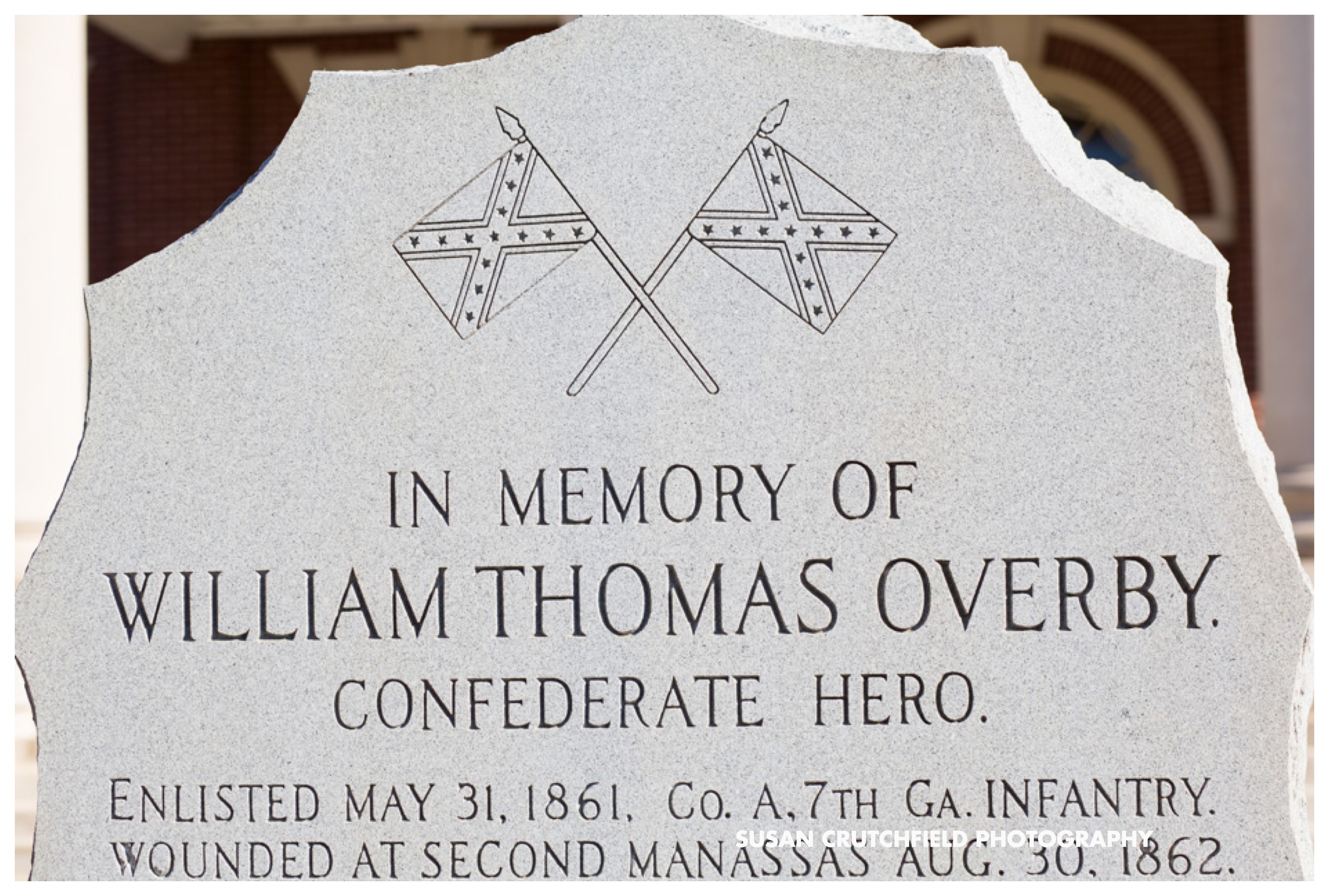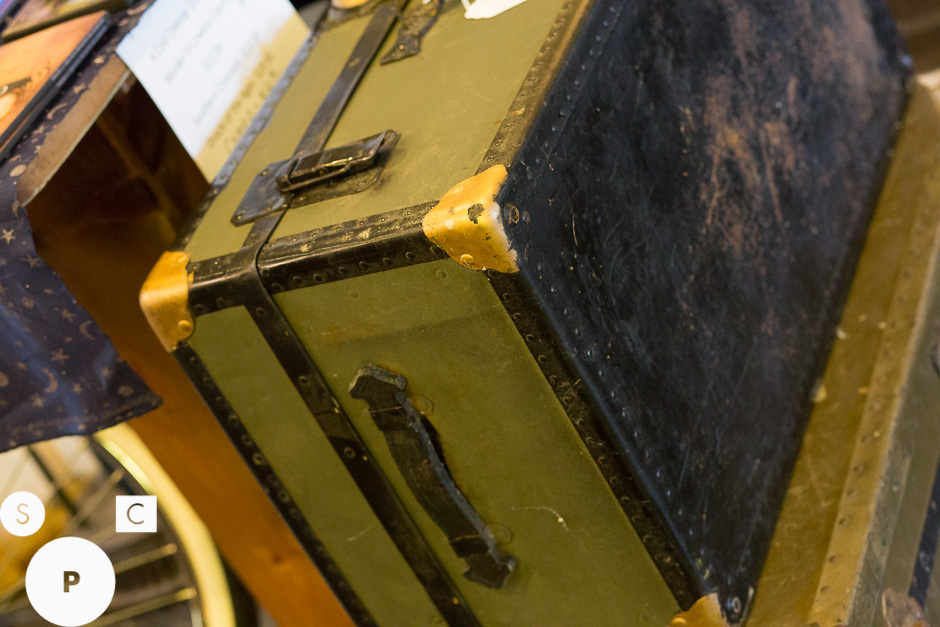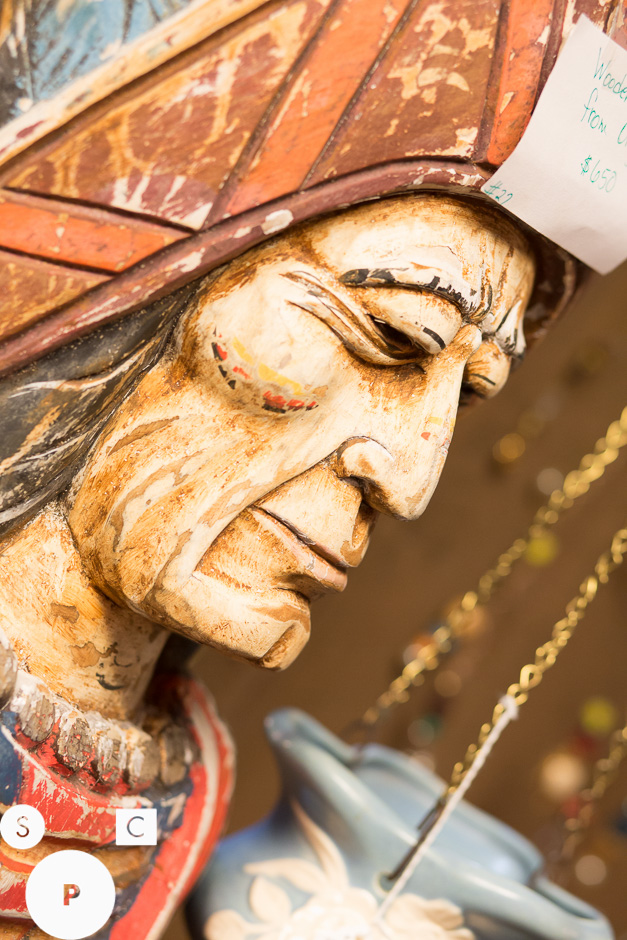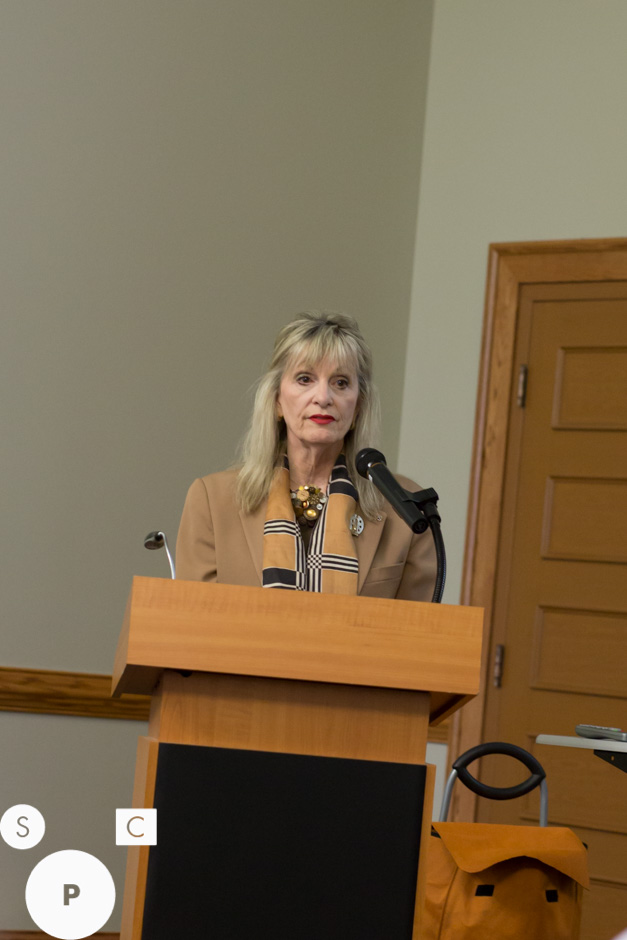A little over 150 years ago on a day in late May, twenty three year old William Thomas Overby left his home in Sharpsburg for what would prove to be the last time.
Overby was born into a respectable Lawrenceville, Virginia family in April of 1837. He was the third of eight children. His family had been comfortably settled in the area since the early 1700s. Two years before William was born, his grandparents decided to pick up and move to the newly created Coweta County. Two years after William was born, his parents followed them. They made their home on a 506-acre plot of land in Sharpsburg, where Thomas Overby farmed and his wife Martha kept house and raised their children. The family seems to have been very involved in the community. They were close with their neighbors and made the half hour journey to Cokes Chapel each Sunday to attend services and socialize.
© Susan Crutchfield Photography
William, known to his friends and family as Billy, was known to have a weak constitution. The Overbys educated their son at Longstreet Institute, a school in Sharpsburg not far from the home of his grandparents. He grew into a tall, dark haired man with large, deep-set eyes and a long, straight nose. A month after the first shots were fired on Fort Sumter, Overby enlisted in Company A of the 7th Regiment Georgia Volunteer Infantry. The Coweta Guards were a group of young men that Overby was related to or had grown up with. He was fighting alongside friends and relatives. This must have made the events of July 21, 1861 extremely difficult. This was the First Battle of Manassas and the first action witnessed by the Coweta Guards. This must have been a shocking introduction to war for a group of newly enlisted men fresh from their hometown. The battle was extremely violent and the regiment had to witness the gruesome deaths of several of their commanders and fellow soldiers. The Coweta Guards would fight in six major Civil War battles as well as several small skirmishes. During this time, Overby watched as his friends were blown up and maimed fighting alongside him. In one incident, Billy witnessed a shell take the head off of his friend Al Parks. The regiments were subjected to tough conditions. They had to move through stifling heat, hole up in waterlogged trenches and crawl on their bellies through sharp stones and thick mud. Disease was not uncommon in these conditions and Overby fell ill and had to spend several days recuperating. Company A of the 7th Brigade earned a reputation for being unrelenting in battle and pushing forward through adverse conditions. Overby was well liked by his fellow soldiers.
Overby continued to fight bravely in the 7th brigade until August 30, 1862. By this point, he had seen many of his fellow soldiers killed and wounded, but he had somehow managed to escape injury. His luck changed during the battle of Second Manassas. His company ended up in the very same spot that had introduced them to the horrors of war a year earlier. This time Overby was not so lucky. It was a rainy August day and the ground was thick with mud. The company was caught in a heavy rain of shells and Overby was hit. Too wounded to move, he laid in the mud as his company advanced without him. It would be two days before he was removed to Warrenton Baptist Church, which was serving as a hospital.
The severity of the wound he received meant that Overby was not fit for moving with his company or engaging in battle. As soon as he was able, he began to assist the hospital doctors in the capacity of a nurse. The conditions in makeshift hospitals at this time were not pretty. There were simply not enough supplies to care for the numerous patients with terrible wounds that were constantly streaming in. We can only imagine the sights that Overby was confronted with were not much better than what he had seen during battle. Poor hygiene practices allowed disease to proliferate in wartime hospitals. Patients, nurses and doctors were all in danger of contracting serious illnesses such as tuberculosis, dysentery, malaria and smallpox.
Shortly after Overby began working as a hospital nurse, Warrenton was captured by Union troops and the hospital changed hands. Over the next two years, Overby worked as a nurse while the hospital continued to fall in and out of enemy hands.
In April of 1864, Overby left his nursing duties to rejoin a company. He joined up with Company D of the 43rd battalion, a group known as Mosby’s Rangers. John S. Mosby was a shrewd soldier, skilled at non-confrontational attacks. He had a knack for retrieving valuable information and taking much needed supplies right out from under the enemies’ noses. Because of his quick wit, he was given control of a company of men that were exempt from the rules that applied to most soldiers. They were not required to wear uniforms and they were allowed to keep spoils from their frequent raids. Mosby insisted on hand picking the men that would become his company. He chose young, well-educated men who had a record of bravery and cleverness. Overby seemed to fit these criteria perfectly.
Mosby’s rangers were incredibly skilled at making quick raids and then disappearing. Because they wore civilian clothes, they simply dispersed and blended into nearby small towns. They mostly worked in the Shenandoah Valley of Virginia, which supplied was a large supplier of food for the Union troops. Their ability to steal food and supplies, sabotage railroads and telegraph lines and cause general havoc infuriated the Union army. General Grant was fed up with them and gave orders that if Mosby or any of his rangers were caught they were to be hanged immediately without trial.
In mid September of 1864, Mosby took a bullet to the groin and was taken to his father’s home to recuperate, leaving Captain William Chapman temporarily in charge of his rangers. On September 23, he gave orders to his brother, Captain Samuel Chapman to interrupt Union communications out of Shenandoah Valley. Captain Chapman took 150 of the rangers to perform a raid on an ambulance wagon train that was carrying supplies and wounded soldiers out of the valley. Overby was one of the men selected to assist with the raid. From far away, it looked to be an easy raid of the kind they performed regularly.
The ambulance train was passing near a small town called Front Royal when Mosby’s Rangers caught up with it. On their way through the town, they were joined by Henry Rhodes. He was a seventeen-year-old boy who idealized the rangers. He had lived in Front Royal all his life and was supporting his young sister and widowed mother. He desperately wanted to join them, and saw his opportunity to prove himself as the men rode through his hometown. He borrowed his mother’s old horse and rode with the rangers toward the ambulance train.
Captain Chapman decided to use their usual method of attack and split the unit into two. One was to attack the back of the wagon train and the other to attack the front and stop the driver. Unseen by the rangers, the wagon train was followed up by two large Federal cavalry units assigned to guard the supplies and wounded men. The unit assigned to the back soon realized the problem and rushed to the front to call off the attack. Unfortunately, the men in the front had already cornered a Union officer, Lieutenant Charles McMaster. According to many Union officers, McMaster threw down his gun and put his hands up in surrender. He was shot anyway and trod on by Ranger horses as they realized they were outmanned and tried to make an escape.
Mosby’s rangers simply didn’t have the men or firepower to go up against the Federal troops. They quickly began to retreat as fast as they could, using their usual tactic of dispersing and blending into the background as civilians. Determined to catch some of the Rangers and avenge the unwarranted death of Lieutenant McMaster, the Federal troops pursued and caught five of the men and Henry Rhodes, whose mother’s horse proved unable to keep up with the demands of a hasty retreat.
David L. Jones, Lucien Love, Carter, William Thomas Overby, and Thomas E. Anderson were all captured by the irate Union troops led by General Torbert. Late in the afternoon, General Torbert and his men marched into Front Royal with Henry Rhodes tied between two horses. He was nearly unconscious by the time they got to the town center. His mother saw him from the window of their house and ran out into the street to plead with Torbert to spare her son who was not even one of the rangers. According to accounts from locals, he held his bayonet to her throat and told her she would be first if she didn’t leave.
The officers locked Carter and Overby in a stable. They then marched Jones and Love behind the church into the graveyard and made them kneel before they shot them in the head at close range. They marched Anderson onto the hill where Lieutenant McMaster was shot and shot him as well. Their treatment of the young Henry Rhodes was especially terrible. As his mother, sister and the town’s people who had know him since he was a boy watched, soldiers marched around him in a circle playing a funeral dirge. Locals later said the lyrics of the dirge were sung in a mocking way. They then executed him in the same way as the others.
Meanwhile, Overby and Carter were captive in a stable and could only guess what the gunshots signified. They may have been able to hear Mrs. Rhodes pleading, screaming and crying for her son’s life. Torbert desperately wanted to know where Mosby and the rest of the company were hiding out. He intensely questioned carter are Overby for some time. Once he realized he could get no information from them, Torbert ordered Captain John Bean to hang the two men and departed. Captain Bean and many of the other Union men were quite shocked and disturbed by what they had just witnessed. Though they had seen many deaths during the course of the war, it was unusual to execute men who had surrendered. They were particularly shocked that General Torbert had done these deeds within the sight of the women and children of the town. Bean put the two men on horses and took them to a walnut tree at the edge of town. Overby held his head high and maintained a stoic expression the entire way there, but Carter did not manage to keep his composure so well. He broke down in sobs and requested a copy of the Bible. As soon as they reached the walnut tree, Captain Bean offered to let them run away if they would only tell him the location of Mosby and the other rangers. Overby again defiantly refused to reveal any information. As the rope was going around his neck witnesses report that his last words were "My last moments are sweetened by the reflection that for every man you murder this day Mosby will take a tenfold vengeance."
Thomas Anderson, one of the first men shot had developed a friendship with Overby during the course of their service together. In recognition of this friendship, when Anderson’s father came to Front Royal to collect his son’s body, he also took Overby’s and buried them in the same graveyard in his hometown of Markham, Virginia. Because of his bravery and refusal to betray his fellow soldiers, he is called the Nathan Hale of the Confederacy. From September 1864 to December 1996 William Thomas Overby remained over 600 miles from his home. Finally, his remains were interred and brought to his hometown. In January of 1997 he received a military funeral with honors. The same year a stretch of highway from 154 to 34 was named in his honor. The farmland where he grew up in Sharpsburg is now a subdivision also named after him. In May of 1956, a monument was erected in Overby's honor in front of the Courthouse on the square of downtown Newnan.












































































































































